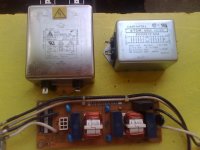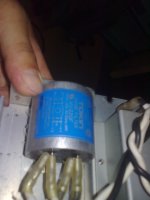What do you guys think about installing a ac line filter before the power transformer. I am talking about something similar used in computer power supplies that doubles as a ac inlet. See pic below
An externally hosted image should be here but it was not working when we last tested it.
Some of the "Golden Ear" crowd seem to think that they muddle up the sound.
Personally,I'm all for them. Keep the nasty crap from all the switching supplies,out of my amp. Never really noticed a big difference in sound,with or without,but it's good peace of mind.
Personally,I'm all for them. Keep the nasty crap from all the switching supplies,out of my amp. Never really noticed a big difference in sound,with or without,but it's good peace of mind.
I've got 'em in all of my tube amp projects; they were leftovers from old work prototypes. The ones I have are Schurter 4A rated medical jobbies.
One thing that I have wondered about using them is......although they may be rated for say 4A, you could easily have pulses of greater than 4A depending on the conduction angle of the power supply rectifiers & caps, and I have no idea if they are still effective at high (pulsed) currents.
I did not use one in my last project, a Mini-A from the Pass Labs forum. (Class A SS).
One thing that I have wondered about using them is......although they may be rated for say 4A, you could easily have pulses of greater than 4A depending on the conduction angle of the power supply rectifiers & caps, and I have no idea if they are still effective at high (pulsed) currents.
I did not use one in my last project, a Mini-A from the Pass Labs forum. (Class A SS).
Great...I am planning to use a Schurter power entry module with a switch, fuses and a filter - all in one package makes everything simpler and cleaner
I don't build anything without a mains filter. Mains supplies are notoriously noisey. You want to keep that mains born noise out of your amp. This is particularly true when toroidal power trannies are used as they have huge bandwidth and noise couples to the secondary very well.
cheers,
Ian
cheers,
Ian
Some may find interest in the following audioXpress articles by Ed Simon (aka simon7000) . . .
An On-Peak Power Supply, Pt. 1
A Line-Cleaning Filter, Pt. 2
An Isolation Transformer, Pt. 3
I went with the following as well as added varistors and surge absorbers. (Oh, and a pair of Bybee's for the overboard factor.)
.
An On-Peak Power Supply, Pt. 1
A Line-Cleaning Filter, Pt. 2
An Isolation Transformer, Pt. 3
I went with the following as well as added varistors and surge absorbers. (Oh, and a pair of Bybee's for the overboard factor.)
An externally hosted image should be here but it was not working when we last tested it.
.
Last edited:
I used the exact thing pictured in my poweramp (300B-XLS SET). I than changed to an unfiltered socket and sound became much clearer and alive.
I have a variety from 1A to 6A fitted to all my audio gear.
I have a few high current common mode inductors to allow discrete building if I need more current ability.
I have a few high current common mode inductors to allow discrete building if I need more current ability.
My opinion:
If you hear a difference between filtered and unfiltered comes because you know when the filter was there or not.
After rectifying there is a DC voltage on your caps, and there is no difference there with or without filter.
Since you amplifiers works on DC voltages, I think the sound difference is between your ears 🙂 !
If you hear a difference between filtered and unfiltered comes because you know when the filter was there or not.
After rectifying there is a DC voltage on your caps, and there is no difference there with or without filter.
Since you amplifiers works on DC voltages, I think the sound difference is between your ears 🙂 !
It is just possible that an amplifier may sound different with and without an external AC line filter.
Why?
I will start the suggestion list with:
The amplifier is marginally stable, due to bad design and this results in non linear amplification when short term transients enter the amplifier, either via the PSU, or via the conventional input nodes.
How to avoid this misbehaviour in the amplifier - design it properly !
How many other reasons are there?
Discuss please.
Why?
I will start the suggestion list with:
The amplifier is marginally stable, due to bad design and this results in non linear amplification when short term transients enter the amplifier, either via the PSU, or via the conventional input nodes.
How to avoid this misbehaviour in the amplifier - design it properly !
How many other reasons are there?
Discuss please.
Could the "clearer" and "more alive" perception be somehow related to the same phenomenon described by some when using AC to power directly heated tubes vs DC?
Some swear that DHT with AC do actually sound more dynamic and alive than DC heated tubes
Some swear that DHT with AC do actually sound more dynamic and alive than DC heated tubes
Interesting !
What about the other way around , suppose you have a class D amp (or 5 of them ) and a SMPS switching like hell , does the line filter do any good keeping all this nasty Mega and Kilohertzes away from your beloved DVD player and preamp and or processor ??
Cheers ,
Rens
What about the other way around , suppose you have a class D amp (or 5 of them ) and a SMPS switching like hell , does the line filter do any good keeping all this nasty Mega and Kilohertzes away from your beloved DVD player and preamp and or processor ??
Cheers ,
Rens
The integrated IEC socket filter, filters in both directions.
It is better (more attenuation) in the forward direction.
It is better (more attenuation) in the forward direction.
Keep posting. The motivation to hook my scope up to the powersupply and measure with different sockets might bloom. Might....
How many short term transients do you think occur during a song (or whatever is being listening to). How many of those transients are of a size that cause a 'change' - or vice-versa get clipped. Imho - zilch.
The emi filter could decrease the stiffness of the AC supply (due to series resistance and a titch of inductance). An isolation transformer would have a similar characteristic.
The capacitance to earth in the filter could lead to noise between the amp earth and the earth use by other connected equipments.
The emi filter could decrease the stiffness of the AC supply (due to series resistance and a titch of inductance). An isolation transformer would have a similar characteristic.
The capacitance to earth in the filter could lead to noise between the amp earth and the earth use by other connected equipments.
My guess, a million.How many short term transients do you think occur during a song ......
I think you are conservative.
Every CFL is producing hash. Refrigerators and other motors produce sizable surges. This stuff is not just from YOUR house, but will come in on the power line from outside as well.
And now the power grid is being used for communications between intelligent power meters and the power company computers.
Power lines are gigantic antennas. They radiate and pick up.
Power is nasty.
Every CFL is producing hash. Refrigerators and other motors produce sizable surges. This stuff is not just from YOUR house, but will come in on the power line from outside as well.
And now the power grid is being used for communications between intelligent power meters and the power company computers.
Power lines are gigantic antennas. They radiate and pick up.
Power is nasty.
How much 50/60Hz do you hear through your speakers??? Is that coming via the AC mains rms level?! Do you think your power supply has similar attenuation for other frequencies, or does it magically lose all filter performance at other audio frequencies?
I suggest you look for other entry paths in to the audio chain for refridgerator and other 'hash' than via conducted mains signals. And if you do have a poor refridgerator, then putting a filter at the amp is the least effective management path for that source of noise.
I suggest you look for other entry paths in to the audio chain for refridgerator and other 'hash' than via conducted mains signals. And if you do have a poor refridgerator, then putting a filter at the amp is the least effective management path for that source of noise.
- Status
- Not open for further replies.
- Home
- Amplifiers
- Power Supplies
- AC Line Filter

